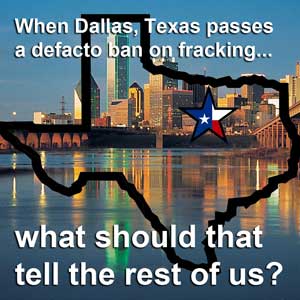Yesterday, the Dallas City Council passed a tough new gas drilling ordinance – a big victory for Dallas residents, and for the rest of the country fighting the fracking boom.
Industry is calling the new ordinance ‘a de facto ban against drilling in Dallas.’ The city will now require that oil and gas wells cannot be sited within 1,500 feet of homes, schools, churches, hospitals, parks, and other 'protected uses'.
Thanks to the city council, Dallas residents, unlike Forth Worth and many other Texas municipalities, needn’t worry about living adjacent to oil and gas development that threatens community health with air, water and soil pollution.
But this isn’t just a victory for Dallas; the ordinance sets a new bar for all communities considering permitting fracking and other unconventional oil and gas development.
That’s because Dallas knows the oil and gas industry, and drilling is a Texas tradition. Dallas lies on the western edge of the Barnett Shale where the fracking boom began, so its residents know fracking and its impacts. They’ve been watching their neighbors wrestle with them for years. So if Dallas, Texas passes a de facto ban on fracking, what does that tell the rest of the country?

And Texas residents have a tool that many other states do not have – the state’s tradition of limiting central government fosters bottom-up decision-making and support for local control. Often that works against local residents – just an hour north of Dallas, fracking will start any day now in the town of Denton, with wells set only 250’ from where people live, work, and play.
In addition to the strong setback requirement for oil and gas wells, Dallas is limiting compressor stations to areas zoned for industrial manufacturing, requiring all chemicals used in drilling to be disclosed with no exceptions or trade secret exemption, requiring baseline water, air and soil testing and independent monitoring, and banning waste injection wells.
We commend the Dallas City Council for its strong stand to protect drinking water, air, and health from the impacts from fracking that have been so devastating to people around the country.
It gives hope to other cities fighting the fracking boom that Dallas — the town long synonymous with the oil and gas industry and home of television's most famous oil baron, J.R. Ewing, — has passed one of the toughest drilling ordinances in the nation.
